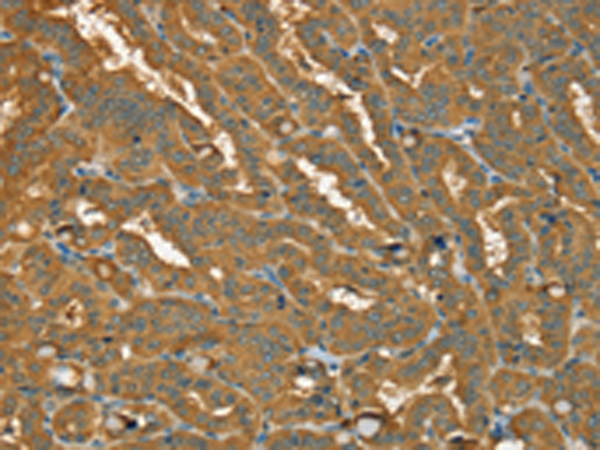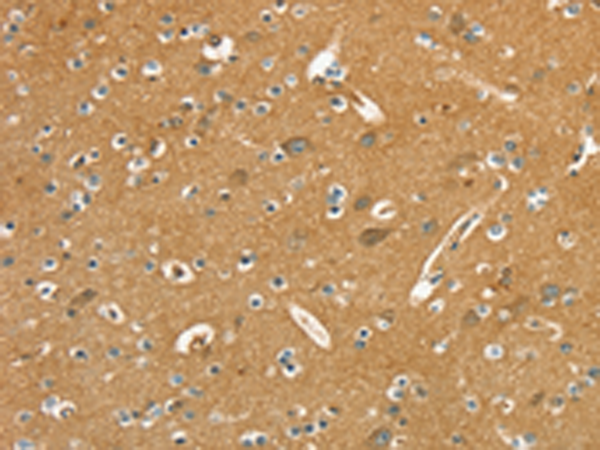


| WB | 1/200-1/1000 | Human,Mouse,Rat |
| IF | 咨询技术 | Human,Mouse,Rat |
| IHC | 1/25-1/100 | Human,Mouse,Rat |
| ICC | 技术咨询 | Human,Mouse,Rat |
| FCM | 咨询技术 | Human,Mouse,Rat |
| Elisa | 1/1000-1/2000 | Human,Mouse,Rat |
| Aliases | GSD6 |
| WB Predicted band size | 97 kDa |
| Host/Isotype | Rabbit IgG |
| Antibody Type | Primary antibody |
| Storage | Store at 4°C short term. Aliquot and store at -20°C long term. Avoid freeze/thaw cycles. |
| Species Reactivity | Human, Mouse, Rat |
| Immunogen | Fusion protein of human PYGL |
| Formulation | Purified antibody in PBS with 0.05% sodium azide and 50% glycerol. |
+ +
以下是模拟生成的3篇关于PYGL抗体的文献示例(仅供参考,实际文献请通过学术数据库查询):
1. **文献名称**:*"Phosphorylase L (PYGL) antibody as a diagnostic marker for hepatocellular carcinoma: Immunohistochemical analysis"*
**作者**:Zhang Y, et al.
**摘要**:研究通过免疫组化验证PYGL抗体在肝细胞癌组织中的高特异性表达,提示PYGL可能作为肝癌的潜在诊断标志物,并与患者预后相关。
2. **文献名称**:*"Role of PYGL in glycogen metabolism: Insights from antibody-based knockdown studies"*
**作者**:Smith JL, et al.
**摘要**:利用PYGL抗体进行蛋白质印迹及功能研究,发现PYGL缺失导致肝细胞糖原分解受阻,揭示了其在能量代谢中的关键作用。
3. **文献名称**:*"Development of a novel monoclonal PYGL antibody for detecting glycogen storage disease type VI"*
**作者**:Kumar R, et al.
**摘要**:报道一种高灵敏度的PYGL单克隆抗体的开发,用于糖原贮积症VI型的分子诊断,并通过ELISA和免疫荧光验证其临床应用潜力。
4. **文献名称**:*"PYGL phosphorylation dynamics revealed by phospho-specific antibodies in metabolic stress"*
**作者**:Chen H, et al.
**摘要**:通过磷酸化特异性PYGL抗体研究其在缺氧和能量应激下的修饰变化,阐明了PYGL活性调控的分子机制。
---
建议通过 **PubMed** 或 **Google Scholar** 搜索关键词“PYGL antibody”、“glycogen phosphorylase L” + “diagnostic/therapeutic”获取真实文献。
PYGL antibody targets the PYGL gene-encoded protein, glycogen phosphorylase liver-type, a key enzyme in glycogenolysis. PYGL catalyzes the cleavage of glycogen into glucose-1-phosphate, a critical step in maintaining blood glucose levels during fasting. Primarily expressed in the liver, PYGL activity is tightly regulated by allosteric effectors and phosphorylation, with hormonal signals (e.g., glucagon) activating it via cAMP-dependent pathways. Dysregulation of PYGL is linked to metabolic disorders, including glycogen storage disease type VI (Hers disease), characterized by hepatomegaly and hypoglycemia.
PYGL antibodies are essential tools in research, enabling the detection and quantification of PYGL protein in tissues or cell lysates using techniques like Western blotting, immunohistochemistry, and immunofluorescence. These antibodies aid in studying hepatic glucose metabolism, pathological mechanisms of glycogen-related diseases, and potential therapeutic targets. Additionally, they help investigate PYGL's role in hepatocellular carcinoma, where altered glycogen metabolism is observed. Commercial PYGL antibodies are typically raised in rabbits or mice, validated for specificity to avoid cross-reactivity with muscle (PYGM) or brain (PYGB) isoforms. Their application extends to preclinical models, enhancing understanding of metabolic adaptation and liver function.
×